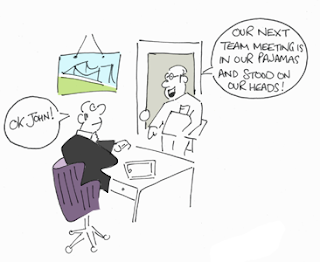Possibly scarred by this kind of experience, many employees still ‘hold their tongues’ in the workplace. They’ve learned a behavior that might not be that great as a consequence… They simply accept the status quo. They don’t ask ‘why are things done this way’? They don’t question the received wisdom. In the worst cases, they don’t even bother paying attention anymore.
My view is that sometimes we shouldn’t mind our own business. Individuals should be encouraged to ask and truly understand ‘why?’. They should feel able to challenge the current practice, protocols or behavior without feeling they will be criticised for it. They may understand ‘what’ they’re supposed to do and ‘how’ they’re supposed to do it, but maybe ‘why’ they should do it simply hasn’t been explained to them!? Asking questions can give them a clearer perspective on their own purpose at work and ultimately will help them understand what is needed, engage and do a better job.
For those who have worked most closely with me, they know that I will often take an opposing view (sometimes even to my own thinking) just to ensure that challenge is being encouraged in the workplace. I can even recall a social experiment that I ran years ago in a work setting, where I secretly asked an influential member of the team to only use the word ‘why’ in a particular meeting. What happened was amazing, every time a point or decision was raised, an influential role model said ‘why’ and what ensued was a more interesting debate and, dare I say, outcome of the meeting.
Are people in your organization wearing blinkers? Do they avoid speaking up? If so, they’re missing out - and so is your business… Performance improvements can be sparked by questions from every level of staff and understanding ‘why’ can help everyone do a better job. It also means employees have to have the courage to ask ‘why’ and be nurtured by a culture that accepts that not minding your own business brings diversity of thinking and input, greater buy-in to the eventual direction, and ultimately greater understanding and connectivity of individuals to the business.


No comments:
Post a Comment